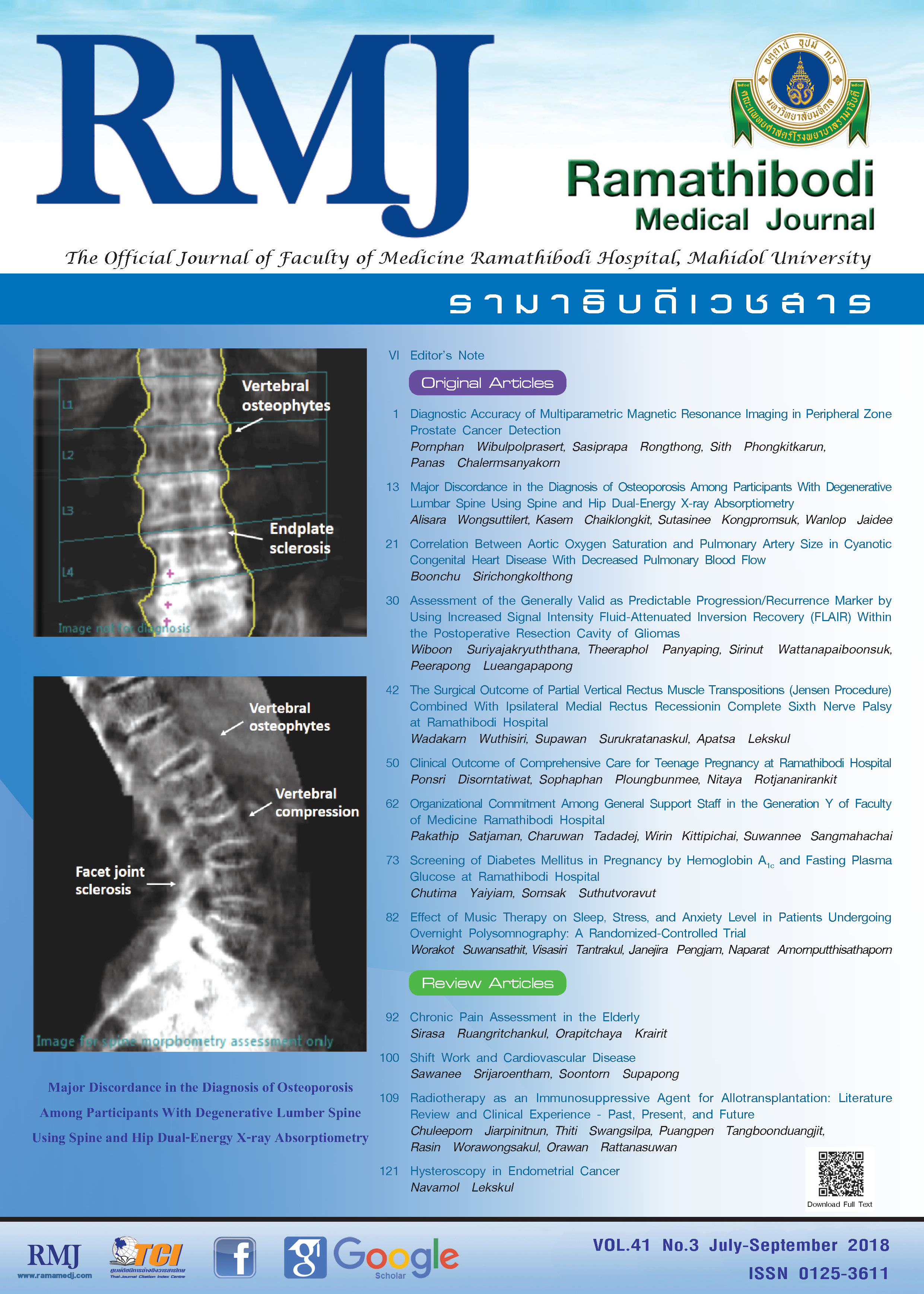Effect of Music Therapy on Sleep, Stress, and Anxiety Level in Patients Undergoing Overnight Polysomnography: A Randomized-Controlled Trial
Main Article Content
Abstract
Background: Music therapy has been used in various types of clinical settings to improve sleep quality and reduce stress and anxiety.
Objective: To determine the effect of music therapy on sleep and stress level in subjects who undergo standard overnight polysomnography (PSG).
Methods: A randomized-controlled trial was conducted at Ramathibodi Hospital Sleep Center. One hundred forty subjects scheduled for standard overnight PSG for the first time were enrolled (70 subjects each in music and control groups). While the control group received only standard care, 30-minute of Thai light music was given to the experimental group during hook up time prior to initiation of PSG.
Results: Compared to controls, stress, and anxiety level after PSG in the music group were significantly lower reflected in post-intervention State Trait questionnaire (35.6 ± 10.8 vs 47.6 ± 6.1; P < 0.01) and difference of pre- and post- PSG State Trait score (-12.4 ± 12.8 vs 0.52 ± 7.7; P < 0.01).
Conclusions: Music therapy substantially reduced stress and anxiety related with overnight PSG. Thus, these could be offered to patients prior to initiation of the sleep test for relaxation. However, there was no alteration in sleep architecture and other sleep quality indices associated with music therapy.
Article Details
References
American Academy of Sleep Medicine. International Classification of Sleep Disorders: Diagnostic and Coding Manual. 2nd ed. Westchester, IL: American Academy of Sleep Medicine; 2005.
Virtanen I, Kalleinen N, Urrila AS, Polo-Kantola P. First-night effect on sleep in different female reproductive states. Behavioral Sleep Medicine. 2016:1-13. doi:10.1080/15402002.2016.1228646.
Hernandez Voth A, Mora Ortega G, Moreno Zabaleta R, et al. Diagnostic value of respiratory polygraphy in patients with low probability of obstructive sleep apnea syndrome. Med Clin (Barc). 2016;146(5):194-198. doi:10.1016/j.medcli.2015.10.016.
Baglioni C, Nissen C, Schweinoch A, et al. Polysomnographic characteristics of sleep in stroke: a systematic review and meta-analysis. PloS One. 2016;11(3):e0148496. doi:10.1371/journal.pone.0148496.
Chan MF, Chan EA, Mok E. Effects of music on depression and sleep quality in elderly people: a randomised controlled trial. Complement Ther Med. 2010;18(3-4):150-159. doi:10.1016/j.ctim.2010.02.004.
Johnson JE. The use of music to promote sleep in older women. J Community Health Nurs. 2003;20(1):27-35. doi:10.1207/S15327655JCHN2001_03.
Chlan L. Effectiveness of a music therapy intervention on relaxation and anxiety for patients receiving ventilatory assistance. Heart Lung. 1998;27(3):169-176. doi:10.1016/S0147-9563(98)90004-8.
Chontichachalalauk J, Malathum P, Hanucharurnkul S, Kredboonsri C. The effect of music therapy on anxiety, physiological responses, and weaning parameters in patients during weaning from mechanical ventilation. Rama Nurs J. 2008;14(3):328-346.
Traiyawong R, Kamalopon P, Hemrungroj K, et al. The effect of music on patients’ intra-operative anxiety in orthopedic surgery under spinal anesthesia. Thai J Anesthesiology. 2011;37(4):206-218.




